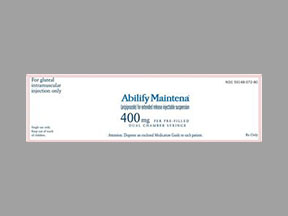
Abilify Maintena Coupons & Savings Card – Discount Prices from $2874.97
My prescription
Edit
400MG, Abilify Maintena (1 Prefilled Syringe)
Select pharmacy

CVS
$2968.50
COUPON PRICE
Albertsons
$2874.97
COUPON PRICE
Walmart
$3034.38
COUPON PRICE
Walgreens
$3035.10
COUPON PRICEAbilify Maintena savings card
Show this card to your pharmacist
Albertsons
$2874.97
BIN
ID
PCN
GRP
019876
LH775542C2
CHIPPO
LHX
Powered by
More prescriptions for schizophrenia
More prescriptions for schizophrenia
Price history for Abilify Maintena
1 Prefilled Syringe, 400MG
Average retail price for Abilify Maintena
Average SaveHealth price for Abilify Maintena
Our price history data is based on aggregated prescription data collected from participating pharmacies in America. Our prescription data updates daily to reflect the latest price changes. If you notice a missing data point, it means there wasn't sufficient data available to generate a monetary value for that date.
*Retail prices are based on pharmacy claims data, and may not be accurate when we don't have enough claims.
Abilify Maintena dosage forms
Dosage Quantity Price from Per unit 300MG 1 Prefilled Syringe $2157.75 $2157.75 400MG 1 Prefilled Syringe $2874.97 $2874.97
| Dosage | Quantity | Price from | Per unit |
|---|---|---|---|
| 300MG | 1 Prefilled Syringe | $2157.75 | $2157.75 |
| 400MG | 1 Prefilled Syringe | $2874.97 | $2874.97 |
What does Abilify Maintena help with?
Abilify Maintena is used to help manage symptoms of schizophrenia and as a maintenance treatment for bipolar I disorder in adults. It is an extended-release injectable form of aripiprazole, which helps to stabilize mood and reduce the risk of relapse in these conditions.
What are the side effects of ABILIFY MAINTENA 300 mg injection?
ABILIFY MAINTENA 300 mg injection may cause several side effects. Common side effects include weight gain, insomnia, restlessness, and injection site reactions such as pain or swelling. Some individuals may experience dizziness, drowsiness, or gastrointestinal issues like nausea and vomiting. More serious side effects can include changes in blood sugar levels, increased cholesterol, and movement disorders such as tremors or muscle stiffness. It's important for patients to discuss any side effects with their healthcare provider, as they can provide guidance and adjust treatment if necessary.
Using the SaveHealth discount card, what is the price of Abilify Maintena without insurance?
Using the SaveHealth discount card, the price of Abilify Maintena without insurance is $2874.97.
What is the price of Abilify Maintena at CVS?
The price of Abilify Maintena at CVS is $2968.50.
What is the price of Abilify Maintena at Walgreens?
The price of Abilify Maintena at Walgreens is $3035.10.
What is the price of Abilify Maintena at Walmart?
The price of Abilify Maintena at Walmart is $3034.38.
